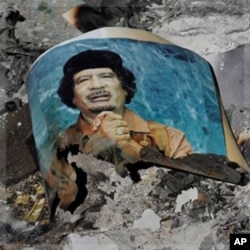It’s time for Libyans to build a new, united Libya, now that Gadhafi is dead. The prime minister of Libya's National Transitional Council, Mahmoud Jibril, made the comment Thursday in Tripoli, at a news conference confirming Gadhafi's death.
The former Libyan leader came to power in a military coup in 1969. His supporters say he was a source of social and economic progress. With the assistance of oil revenues, Libya’s small population has enjoyed one of the continent’s highest rates of economic growth. Loyalists say with that money, he built roads, schools and hospitals, at least in his early years in power.
Others, like Wayne White, an adjunct scholar with the Washington-based Middle East Institute, cite his extravagance and say he will be remembered for waste, misgovernment and corruption.
“Gadhafi hindered Libyan development very seriously,” said White. “That is why Libya in many ways is one of the least capable of the Arab oil states that can take care of itself without foreign assistance.
“He also wasted hundreds of billions of dollars on silly projects like the Great Man-made River Project [a vast network of pipes and aqueducts] which never produced much in the way of farming.”
White said Gadhafi’s authoritarian governance will make it harder to establish democratic rule in Libya
“He ruled with a divide and rule system pitting tribe against tribe, creating regional rivalries, and he also stifled civil society to such a degree that it will be a hard job for the NTC, its successors and even rebels who have spent too much time fighting to settle down into a period of not being rebels and form a government.”
One way to bring about unity in the years ahead is the creation of a truth and reconciliation commission. More than 50 such commissions have been created around the world in recent years, including one a few years ago in neighboring Morocco, said Professor William Schabas, a professor of international law at the University of Middlesex in London.
“The success of any institution like this,” he said, “relies on the credibility of the institution, and that means finding people who are deemed to be credible and who are going to be acceptable to the public. In a country like Libya, that has many different political constituencies, it’s going to be a challenge because even people who do not like the Gadhafi regime are not all going to agree on who is going to do this type of job.”
Another potential challenge in creating a truth and reconciliation mission is determining its mandate.
“There are issues of how far back do you go,” said Schabas. “What’s the time frame, the geographic scope, what are the violations, the issues you’re looking at? All of these things define a truth commission and they are what make them controversial when they are being established.
“There will be about 25 different visions of what is important to get at,” he continued, “in terms of the search for truth within Libyan society, and then there will be some people who want to know the truth about some aspects of the past, but not others. That’s another difficulty.”
Schabus said truth commissions often reflect tensions between victors and survivors, and among factions of the new forces.
“A truth commission can alter the landscape,” he said, “the relationship between those various bodies, and I think that that means in Libya it is full of potential but depending on who you are, it’s also full of danger.”
One of the earliest truth commissions was established in Uganda in 1974. Its mandate was to look into civilian disappearances attributed to the military over the previous three years. The government of then-President Idi Amin rejected its findings of government abuse of power, including by the security agencies and the military.
“When it released its report,” said Schabus, “the commissioners were so honest and had much integrity that they had to leave the country and get refugee status outside. I don’t think that will be (the case) with Libya.”

















